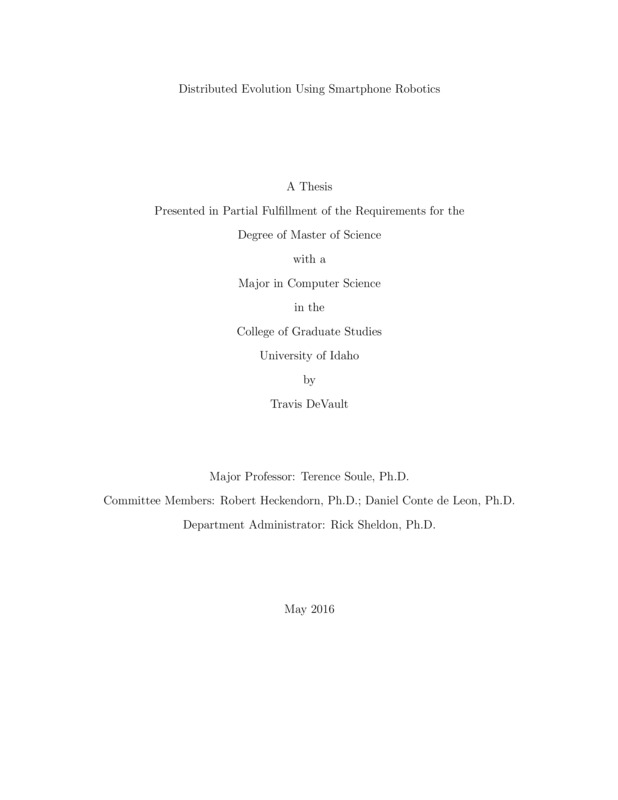Distributed Evolution Using Smartphone Robotics
DeVault, Travis Donald. (2016). Distributed Evolution Using Smartphone Robotics. Theses and Dissertations Collection, University of Idaho Library Digital Collections. https://www.lib.uidaho.edu/digital/etd/items/devault_idaho_0089n_10691.html
- Title:
- Distributed Evolution Using Smartphone Robotics
- Author:
- DeVault, Travis Donald
- Date:
- 2016
- Keywords:
- Artificial Intelligence Evolutionary Computation Robotics
- Program:
- Computer Science
- Subject Category:
- Computer science
- Abstract:
-
In learning from demonstration (LfD) a human trainer demonstrates desired
behaviors to a robotic agent, creating a training set that the agent can learn from.
LfD allows non-programmers to easily and naturally train robotic agents to perform
specific tasks. However, to date most LfD has focused on single robot, single trainer
paradigms leading to bottlenecks in both the time required to demonstrate tasks and
the time required to learn behaviors. A previously untested approach to addressing
these limitations is to use distributed LfD with a distributed, evolutionary algorithm.
Distributed learning is a model for robust real world learning without the need for a
central computer. In the distributed LfD system presented here multiple trainers train
multiple robots on different, but related, tasks in parallel and each robot runs its own
on-board evolutionary algorithm. The robots share the training data, reducing the
total time required for demonstrations, and exchange the genetic encoding from the
best solutions they've discovered. In these experiments robotic performance on a task
after distributing either the genetic encoding for behavior or the demonstrations used
to learn single behaviors are compared to the performance using a non-distributed
LfD model receiving demonstrations used to learn multiple behaviors. Results show
an improvement in performance when distributing training data on single behaviors
greater than the improvement in performance when the sharing genetic information
of robots trained on multiple behaviors. This implies that robots can learn robust
performance of multiple part tasks by learning each of the individual parts of a task
and distributing the training of the robot.
- Description:
- masters, M.S., Computer Science -- University of Idaho - College of Graduate Studies, 2016
- Major Professor:
- Soule, Terence; Heckendorn, Robert
- Committee:
- Conte de Leon, Daniel
- Defense Date:
- 2016
- Identifier:
- DeVault_idaho_0089N_10691
- Type:
- Text
- Format Original:
- Format:
- application/pdf
- Rights:
- In Copyright - Educational Use Permitted. For more information, please contact University of Idaho Library Special Collections and Archives Department at libspec@uidaho.edu.
- Standardized Rights:
- http://rightsstatements.org/vocab/InC-EDU/1.0/

